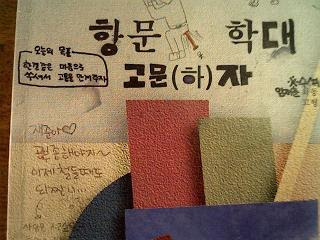In the world of K-entertainment, there are a few things that can drag even the most-loved superstar of the highest popularity down into the mud in the blink of an eye.
The two biggest reasons that can end your career are 왕따 scandal and 병역 scandal ("병역" means "military duty" -- "병" is chinese for "army," as in "병사 (soldier)" or "병력 (strength of the army)," and "역" means "duty," as in "역할 (given responsibility).")
Being the instigator to ostracize someone is of course terrible, as so many Koreans have been on the receiving end of bullying and ostracizing. Once you are involved in such a scandal (most notably, T-ara, whose story I will write about in the next week or so), you gain a lot of haters (anti-fans, Koreans call them) and your K-entertainment career is more or less over.
Avoiding active military duty is along the same lines of thought. Given the situation with North Korea, all Korean men must serve full-time in the military for about one year and nine months, putting their lives on hold. You must enlist between the ages of 18 and 30, although for most Koreans, you are not given a choice of when to enlist. You go when you are served a notice. Therefore, if someone manages to avoid this duty using sketchy means, this brings on the rage of all Korean men, their mothers, sisters, daughters, girlfriends, and relatives (aka all Koreans).
The thing is, it is really hard for the celebrities who are at the height of their popularity to drop everything, put their lives on hold, and disappear from the public eye for almost two years. They are probably afraid that they will be forgotten, and that they will never return to the same level of popularity when they are discharged. So many celebrities are still caught trying to avoid the military duty (including PSY, who tried to get discharged early; he ended up enlisting twice.)
Not only this, the military is known for its terrible living conditions, and for its tradition of bullying and hazing -- Korean society is already hierarchical; add the military structure which is even more hierarchical, and the rest is left to your imagination!
Nonetheless, few good posts exist; you could be a public servant (공익근무요원) and commute from home; you could also join the publicity team of the Korean military, which is significantly less demanding physically, and in terms of hierarchy. Because of their social statuses, many celebrities end up going to one of these posts, and this is constantly the target of ridicule and hatred of the Korean public.
On the other hand, there's a twist. If a celebrity at the height of his popularity successfully completes his term of military duty, serving as an active soldier (as opposed to a public servant or a publicity team member), they can win the admiration of the Korean public. Of course, this is a difficult route to go to. They would be mingling with random members of the public, and they would be watched all the time by the other members of their squadron. Should they slack off, or be less than exemplary, you can be sure that the story will make it to the internet. Essentially, they are signing themselves up for nearly two years of hard labour in which you are not allowed to slack off, ever.
When a celebrity does this feat, they achieve what the Korean internet users call "까방권," which is short for "까임방지권."
"까임,"which is noun form for the verb "까다," means "badmouthing." This is a widely used slang, although not appropriate for polite company.
"방지" means "prevention," and it is standard Korean.
"권" is Chinese for "right," as in "권리 (right)" or "여권 (passport, literally your right to travel)."
In short, when a celebrity completes an exemplar military service, he gains "the right to be never badmouthed again." When a celebrity is honorably discharged from active military duties, the Koreans will say:
Why don't more celebrities do it? I think it speaks more to the difficulty of being in the Korean military. When you get a chance, you should ask the Koreans about their military experience. You will be astounded at some of the answers you get!
The two biggest reasons that can end your career are 왕따 scandal and 병역 scandal ("병역" means "military duty" -- "병" is chinese for "army," as in "병사 (soldier)" or "병력 (strength of the army)," and "역" means "duty," as in "역할 (given responsibility).")
Being the instigator to ostracize someone is of course terrible, as so many Koreans have been on the receiving end of bullying and ostracizing. Once you are involved in such a scandal (most notably, T-ara, whose story I will write about in the next week or so), you gain a lot of haters (anti-fans, Koreans call them) and your K-entertainment career is more or less over.
Avoiding active military duty is along the same lines of thought. Given the situation with North Korea, all Korean men must serve full-time in the military for about one year and nine months, putting their lives on hold. You must enlist between the ages of 18 and 30, although for most Koreans, you are not given a choice of when to enlist. You go when you are served a notice. Therefore, if someone manages to avoid this duty using sketchy means, this brings on the rage of all Korean men, their mothers, sisters, daughters, girlfriends, and relatives (aka all Koreans).
The thing is, it is really hard for the celebrities who are at the height of their popularity to drop everything, put their lives on hold, and disappear from the public eye for almost two years. They are probably afraid that they will be forgotten, and that they will never return to the same level of popularity when they are discharged. So many celebrities are still caught trying to avoid the military duty (including PSY, who tried to get discharged early; he ended up enlisting twice.)
Not only this, the military is known for its terrible living conditions, and for its tradition of bullying and hazing -- Korean society is already hierarchical; add the military structure which is even more hierarchical, and the rest is left to your imagination!
Nonetheless, few good posts exist; you could be a public servant (공익근무요원) and commute from home; you could also join the publicity team of the Korean military, which is significantly less demanding physically, and in terms of hierarchy. Because of their social statuses, many celebrities end up going to one of these posts, and this is constantly the target of ridicule and hatred of the Korean public.
On the other hand, there's a twist. If a celebrity at the height of his popularity successfully completes his term of military duty, serving as an active soldier (as opposed to a public servant or a publicity team member), they can win the admiration of the Korean public. Of course, this is a difficult route to go to. They would be mingling with random members of the public, and they would be watched all the time by the other members of their squadron. Should they slack off, or be less than exemplary, you can be sure that the story will make it to the internet. Essentially, they are signing themselves up for nearly two years of hard labour in which you are not allowed to slack off, ever.
When a celebrity does this feat, they achieve what the Korean internet users call "까방권," which is short for "까임방지권."
"까임,"which is noun form for the verb "까다," means "badmouthing." This is a widely used slang, although not appropriate for polite company.
"방지" means "prevention," and it is standard Korean.
"권" is Chinese for "right," as in "권리 (right)" or "여권 (passport, literally your right to travel)."
In short, when a celebrity completes an exemplar military service, he gains "the right to be never badmouthed again." When a celebrity is honorably discharged from active military duties, the Koreans will say:
"까방권 얻었네. 축하한다!" (You gained a 까방권; congratulations!)Suppose that a celebrity with a 까방권 commits a minor fault, say he spoke to someone older using the informal speech instead of using honorifics. Usually, this would get the Koreans pretty upset, but for this celebrity, the Koreans might say:
"군대에서 열심히 생활한 사람이 일부러 반말을 하진 않았을거야. 까방권 있으니 봐주자. " (He was a model soldier during military service, and he probably didn't do it on purpose. Since he has a 까방권, we should let it slide.)This is a pretty astounding right, because the Korean internet users are known for being vicious! And unless you commit another high-profile error (such as 왕따, DUI, or drugs), your 까방권 lasts for life.
Why don't more celebrities do it? I think it speaks more to the difficulty of being in the Korean military. When you get a chance, you should ask the Koreans about their military experience. You will be astounded at some of the answers you get!















